2021
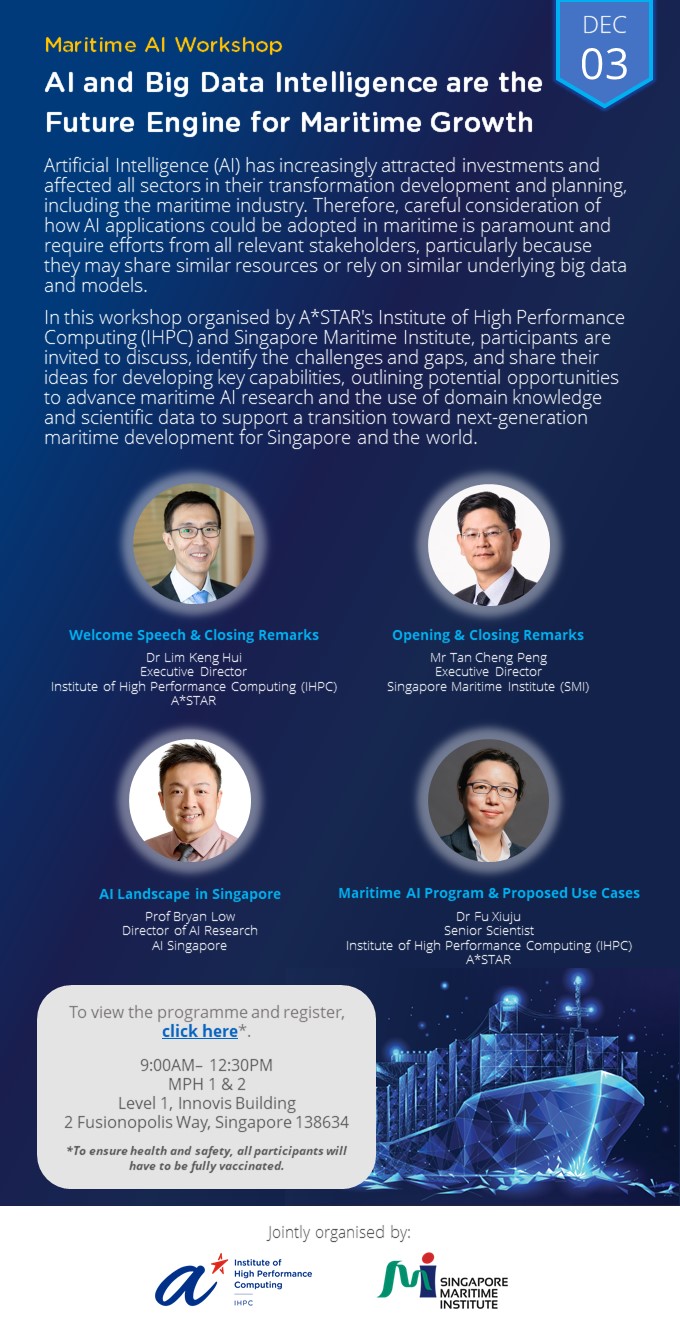
[BY INVITATION] MARITIME AI WORKSHOP
3 Dec 2021
Artificial Intelligence (AI) has increasingly attracted investments and affected all sectors in their transformation development and planning, including the maritime industry. Therefore, careful consideration of how AI applications could be adopted in maritime is paramount and require efforts from all relevant stakeholders, particularly because they may share similar resources or rely on similar underlying big data and models.
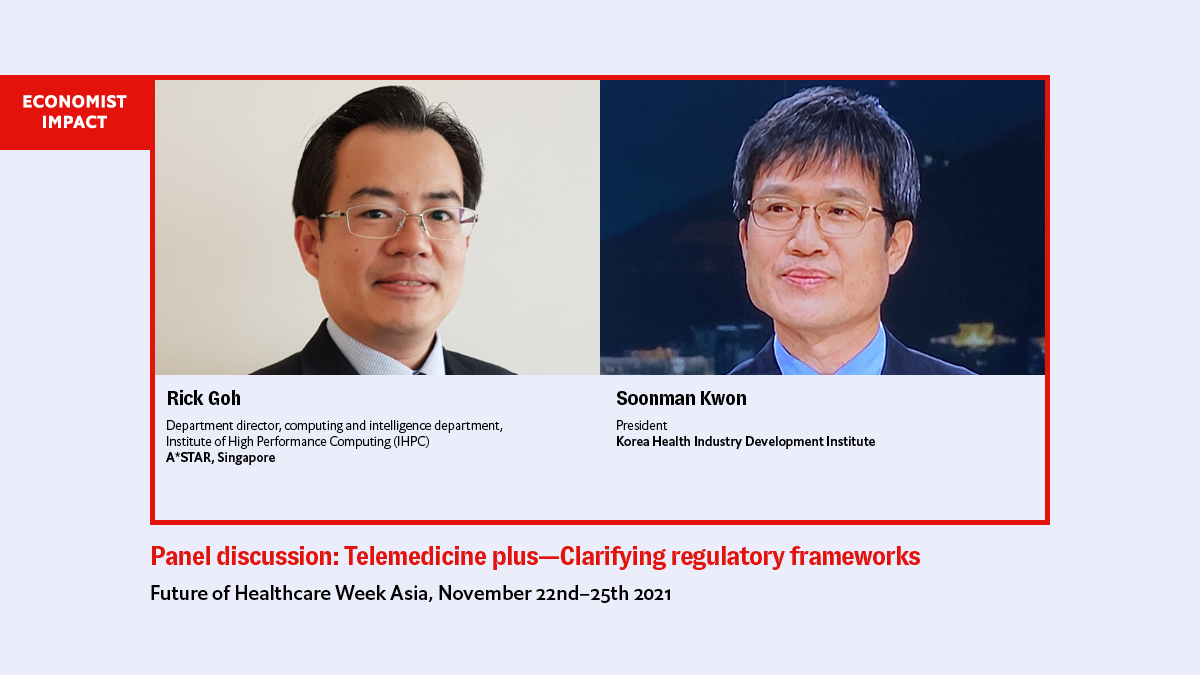
[PANEL DISCUSSION] TELEMEDICINE PLUS - CLARIFYING REGULATORY FRAMEWORKS
23 Nov 2021
Regulations around telemedicine need to be promptly clarified, as do those regarding the use of AI in healthcare and the ethical considerations
Dr Rick Goh, Department Director, Computing and Intelligence, A*STAR's Institute of High Performance Computing (IHPC) and Dr Soonman Kwon, President, Korea Health Industry Development Institute shared more insights at the live interaction.
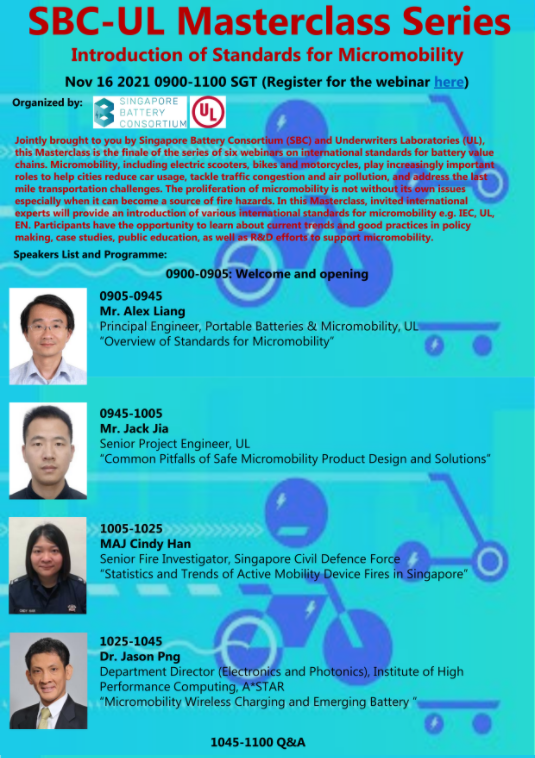
[WEBINAR] SBC-UL MASTERCLASS: INTRODUCTION OF STANDARDS FOR MICROMOBILITY
16 Nov 2021
Micromobility, including electric scooters, bikes and motorcycles, play increasingly important roles to help cities reduce car usage, tackle traffic congestion and air pollution, and address the last mile transportation challenges. The proliferation of micromobility is not without its own issues especially when it can become a source of fire hazards. This Masterclass is the finale of the series of six webinars on international standards for battery value chains, jointly brought by Singapore Battery Consortium (SBC) and Underwriters Laboratories Inc.
Dr Jason Png, Department Director of Electronics and Photonics at A*STAR's Institute of High Performance Computing (IHPC) shares more insights on Micromobility Wireless Charging and Emerging Battery.
In this upcoming ACCM Webinar, participants will have the opportunity to hear from Dr. Rick Goh, AI Scientist and Department Director of Computing and Intelligence Department from the A*STAR Institute of High Performance Computing (IHPC). Besides weighing in on his industry-oriented, academically-backed perspectives on AI and machine learning; Dr Rick will also demystify the main challenges of developing AI models, as well as share some of the real-world benefits and impacts that AI could offer.
.jpg?sfvrsn=16e6779d_0)
[WEBINAR] A*STAR DIGITAL EMOTIONS INDUSTRY SYMPOSIUM
15 Sep 2021
The A*STAR Digital Emotions Industry Symposium aims to introduce A*STAR’s high Technology Readiness Level (TRL) capabilities in Digital Emotions to a broader industry and practitioner audience. This year’s focus is to introduce 𝙍𝙚𝙨𝙤𝙣𝙖𝙣𝙘𝙚 𝙎𝙤𝙘𝙞𝙖𝙡 - the new end-to-end advanced social listening platform solution. We bring you an exciting line-up of speakers ranging from affective computing technologists to industry experts from public administration, media, communication and deeptech startup.
Speakers:
- The Science behind Digital Emotions | Dr Yang Yinping, Senior Scientist & Principal Investigator of Digital Emotions, Institute of High Performance Computing, A*STAR
- Introducing Resonance Social: Democratising Social Analytics | Ms Therese Quieta, Innovation Lead and Resonance Social Engineer Team Co-Lead, Institute of High Performance Computing, A*STAR
- Expert Panel Discussion: Leading Public, Consumer and Social Innovations
Moderator:
> Ms Amy Foo, Director, Modern Services and Built Environment, Enterprise Division, A*STAR
Panellists:
> Mr Eddy Goh, Deputy Director, Transformation & Research Analytics, Public Transport Council
> Mr Bertrand Tan, Head, Analytics, Corporate Communications Division, A*STAR
> Ms Shen Yue, Branding & Audience Editor Chinese Media Group, Singapore Press Holdings
> Mr Manuel Ho, Founder and CEO, INTNT.AI
![IHPC Quantum Talk Series [5-5] Simulating Quantum Dynamics with NISQ Devices](/images/librariesprovider15/default-album/ihpc-quantum-talk-series-5-5.png?sfvrsn=b7f711b4_0)
[WEBINAR] IHPC QUANTUM TALK SERIES [5/5]
21 May 2021
Simulating Quantum Dynamics with NISQ Devices
In this talk, Mr. Kishor Bharti from the Centre for Quantum Technologies, National University of SIngapore will discuss the progress at the frontier of digital quantum simulation with NISQ devices and present a summary of their recent results in this direction.
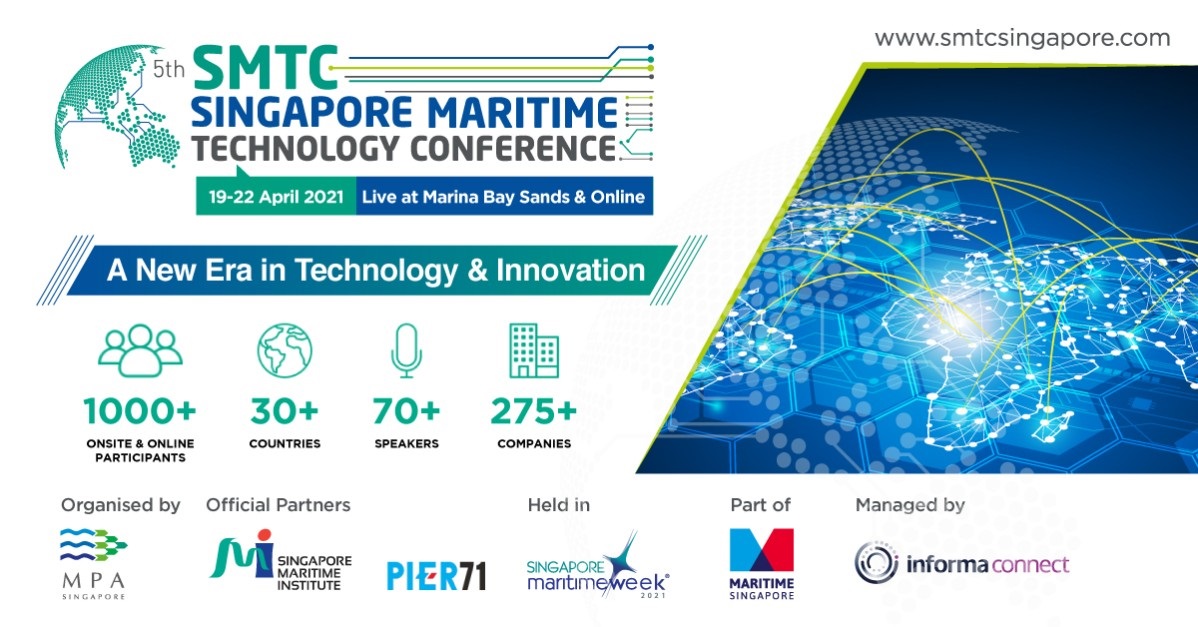
SINGAPORE MARITIME TECHNOLOGY CONFERENCE (SMTC) 2021
22 Apr 2021
[WEBINAR] AI ROUNDTABLE: INTEGRATING HUMAN AND INTELLIGENCE MACHINES AT SEA AND SHORE
- Catching up on AI revolution
- Is AI cost reduction mechanism or a thrilling possibility for progressive growth?
- Readiness – a reality check!
- Building a business case for AI in the shipping company
Dr. Xiuju Fu, Senior Scientist from A*STAR Institute of High Performance Computing (IHPC) are joining a group of expert panellists at the SMTC 2021 to discuss topics on human and artificial intelligence (AI) contributions to the maritime sectors.
Moderator:
> Charles Crouspeyre, Artificial Intelligence Director, A.I. ASEAN Lead, Accenture AI, Singapore
Panellists:
> Prof Chen Tsuhan, Chief Scientist, AI Singapore
> Koichiro Hayashi, Manager of Bulk/Energy Research Team, NYK, Japan
> Claus Nehmzow, Chief Innovation Officer, Eastern Pacific Shipping, Singapore
> Pierre Guillemin, Vice President Technology, Wärtsilä Voyage, Finland
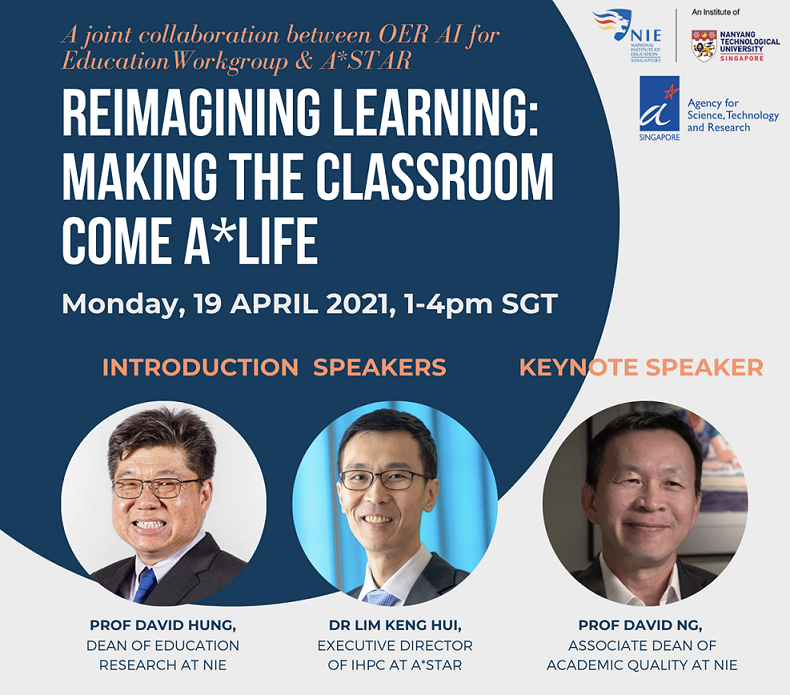
REIMAGINING LEARNING: MAKING THE CLASSROOM COME A*LIFE
19 Apr 2021
The Office of Education Research at NIE and Institute of High Performance Computing at A*STAR are jointly organising a workshop on the application of AI for Education. The objective of the workshop is to allow researchers and domain stakeholders to share their research interests in order to foster collaboration between the two institutions.
- Affective Computing
- Student Assessment
- AI Learning Companions
- Blended Learning
- Effective Computer Science Instruction with AI
![IHPC Quantum Talk Series [4-5] IHPC Quantum Talk Series [4-5]](/images/librariesprovider15/default-album/ihpc-quantum-talk-series-4-5.png?sfvrsn=d2f17622_0)
[WEBINAR] IHPC QUANTUM TALK SERIES [4/5]
16 Apr 2021
Near-term Quantum Algorithms for Linear Systems of Equations
In this talk, Mr. Kishor Bharti from the Centre for Quantum Technologies, National University of Singapore will share how he and his co-authors design near-term algorithms and use them to scale up system sizes in near-term quantum devices of about 100-300 qubits.
![IHPC Quantum Talk Series [3-5] IHPC Quantum Talk Series [3-5]](/images/librariesprovider15/default-album/ihpc-quantum-talk-series-3-5.png?sfvrsn=d62bb350_0)
[WEBINAR] IHPC QUANTUM TALK SERIES [3/5]
9 Apr 2021
Optimal Resource Cost for Error Mitigation
In this talk, Dr. Ryuji will share how the results offer insights into the potential and limitations of feasible error mitigation on near-term devices and also display a useful application of ideas and tools in resource theories.
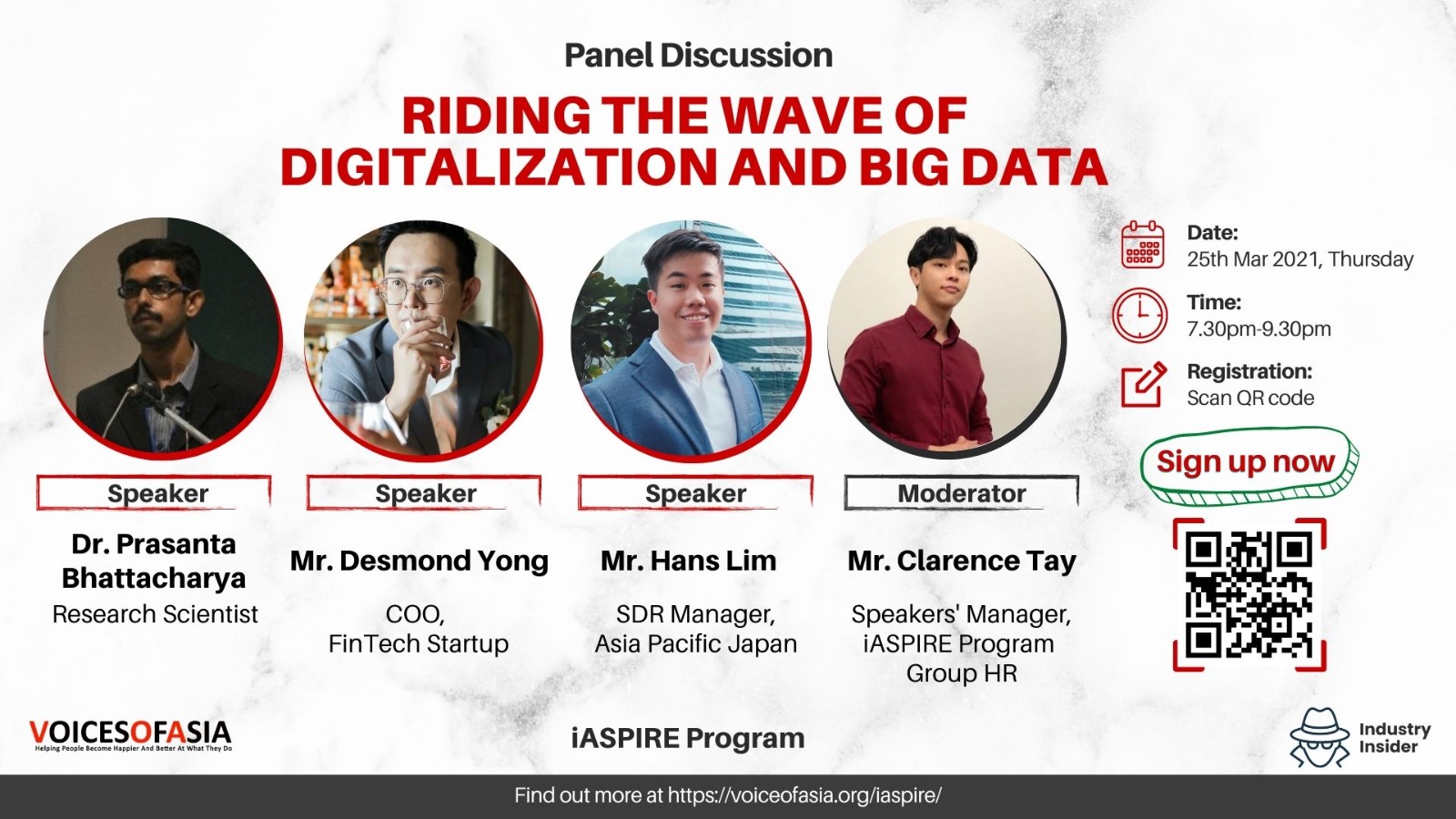
[PANEL DISCUSSION] RIDING THE WAVE OF DIGITALIZATION AND BIG DATA
25 Mar 2021
Radical digital transformation and BIG Data is increasingly becoming a necessity for enterprises and firms thinking strategically about how they
Voice of Asia (VoA) is organising a panel discussion with industry practitioners to understand how businesses’ are navigating digital transformation and utilising data to reinvent themselves.

SINGAPORE SKIN RESEARCH WEBINAR SERIES
24 Mar 2021
Transdermal Delivery II - In Silico Methodologies for Investigating Skin Penetration
Topical formulations represent a direct and convenient route to deliver actives through the skin. The stratum corneum presents a major barrier to percutaneous absorption, that can limit the penetration of the active to the deeper skin layers or soft tissues. To assess skin penetration, several in vitro methodologies, including artificial membranes, reconstructed human skin equivalents, animal and human ex-vivo skin tissue, used in conjunction with diffusion cells have been developed.
![IHPC Quantum Talk Series [2-5] IHPC Quantum Talk Series [2-5]](/images/librariesprovider15/default-album/ihpc-quantum-talk-series-2-5.png?sfvrsn=ef53ca9c_0)
[WEBINAR] IHPC QUANTUM TALK SERIES [2/5]
12 Mar 2021
QAE and IQAE: A Blueprint for Quantum Advantage
-workshop.jpg?sfvrsn=b20f74d_0)
[WEBINAR] GLOBAL MARITIME TRAFFIC MANAGEMENT (MTM) WORKSHOP
25 Feb 2021
Panel Discussion: Development Trends and Emerging Technologies for Maritime Traffic Management
Dr Fu Xiuju, Senior Scientist at A*STAR's Institute of High Performance Computing was invited to join other panellists to share their thoughts on trending topics in maritime traffic management (MTM).
Panellists:
- Mr David Foo, Assistant Chief Executive (Operations Technology), Maritime and Port Authority of Singapore (MPA)
- Mr Todd Schuett, Innovation Project Manager, Kongsberg Norcontrol
- Mr Duane Hand, Senior Solution Engineering Manager, Speedcast
Moderator: Mr Ronny Waage, Managing Partner, Heron Advisory
![IHPC Quantum Talk Series [1-5] IHPC Quantum Talk Series [1-5]](/images/librariesprovider15/default-album/ihpc-quantum-talk-series-1-5.png?sfvrsn=d1eebdf6_0)
[WEBINAR] IHPC QUANTUM TALK SERIES [1/5]
19 Feb 2021
Estimating Quantum Expectation Values using Classical Shadows on Noisy Quantum Computers
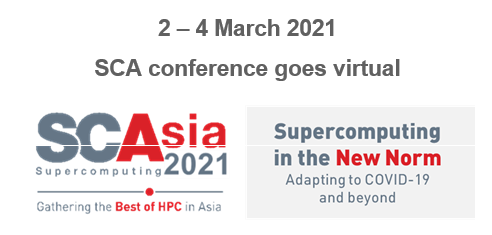
SUPERCOMPUTINGASIA (SCA) 2021
2-4 Mar 2021
The COVID-19 pandemic has caused severe disruption to global economic activity and brought significant impacts, affecting different
sectors in varying degrees and people's everyday lives. IHPC has taken a step ahead to understand the virus and invested R&D efforts to help public sector agencies and business owners combat challenges and carry out operational activities with safety measures.
During the virtual presentation under HPC-AI for COVID New Normal, participants get to learn how IHPC demonstrates computational modelling expertise using HPC and artificial intelligence (AI) to promote safe reopening of economic activities and distancing measures. Some used cases include understanding airborne droplets' spread and movement in different conditions and environments, tracking emotional responses during COVID, predicting car mobility behaviour and more.
- COVID-19 Big Social Data Analytics: Enabling Communication Science Enquires through Emotion Analytic Social Technologies
- AI Models for Detecting Pneumonia using Chest X-rays
- Pandemic-inspired Computational Model for Pandemic Proofing Society
- Spatial-temporal Potential Exposure Risk Analytics and Urban Sustainability Impacts related to COVID-19 Mitigation: A Perspective from Car Mobility Behaviour
- Modelling of Safe and Efficient Germicidal UV-C LED Solutions
If you wish to find out more on above presented talks, do write to us at enquiry@ihpc.a-star.edu.sg.
A*STAR celebrates International Women's Day

From groundbreaking discoveries to cutting-edge research, our researchers are empowering the next generation of female science, technology, engineering and mathematics (STEM) leaders.
Get inspired by our #WomeninSTEM
.png?sfvrsn=ff199933_15)